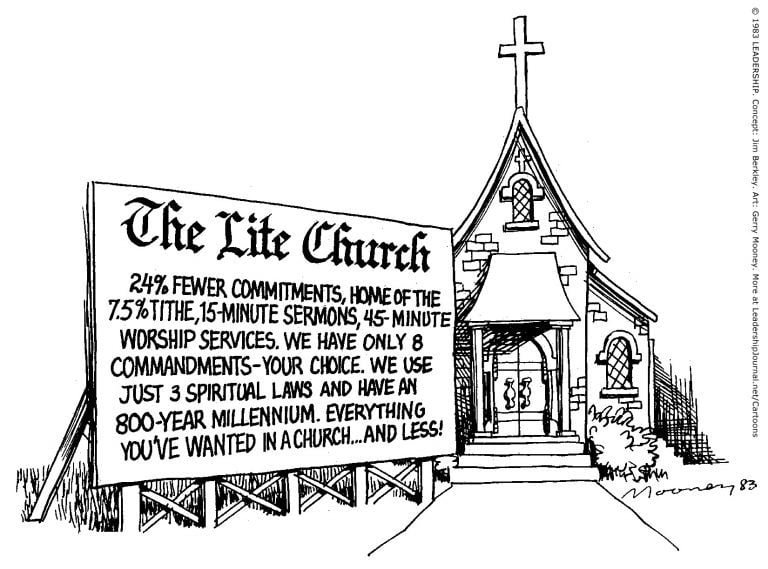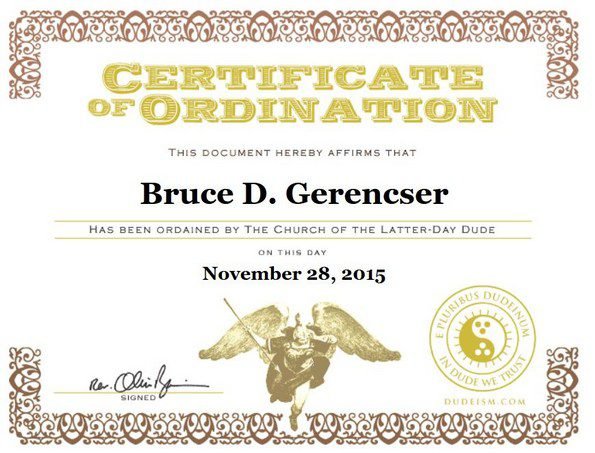
Several years ago, I attended a sporting event for one of my grandchildren that brought me in close contact with a large group of Evangelicals. Over the course of ninety minutes, as I stood there photographing the game, I listened to these Evangelicals talk about their churches, other churches, summer missionary trips, and helping the poor, homeless, and downtrodden. I later told my son about my eavesdropping and how their discussions were very much like the discussions we would have had a decade or two ago. These Evangelicals spoke as if they and their churches were doing monumental works that were making tremendous differences in the lives of those they came in contact with. And from their seat in the pew, I’m quite sure it “seems” like they are doing things that matter, but when considered in a broader context, their mighty works for Jesus amount to little or nothing. Certainly, to the person given a meal or coat, their acts of charity made a difference, but when taken as a whole, the charitable works performed by Evangelicals are little more than a drop of rain in the ocean. Within the Evangelical bubble, these acts of compassion often become larger-than-life. Evangelical teenagers raise money to take mission trips to so-called third-world countries. While no one would say that nothing good comes from these mission trips, when the work done is compared to the money spent, it becomes quite clear that money spent on travel, meals, and entertainment would be better spent by locals instead of Evangelical do-gooders from afar. The returning teens and adults have wondrous testimonies to share, but rarely will anyone bother to consider if any real, lasting good was done.
On the home front, Evangelical churches proudly speak of their ministries to those whom the Bible calls “the least of these.” Again, my purpose here is not to criticize Evangelicals for the good that they do, but I think is important to view their acts of charity in context and judge them according to overall church and ministry budgets. Jesus made clear in the Gospels that what Christians spend their money on shows what really matters to them. Matthew 6:19-21 states:
Lay not up for yourselves treasures upon earth, where moth and rust doth corrupt, and where thieves break through and steal: But lay up for yourselves treasures in heaven, where neither moth nor rust doth corrupt, and where thieves do not break through nor steal: For where your treasure is, there will your heart be also.
And in Matthew 25:31-40, we find these words:
When the Son of man shall come in his glory, and all the holy angels with him, then shall he sit upon the throne of his glory: And before him shall be gathered all nations: and he shall separate them one from another, as a shepherd divideth his sheep from the goats: And he shall set the sheep on his right hand, but the goats on the left. Then shall the King say unto them on his right hand, Come, ye blessed of my Father, inherit the kingdom prepared for you from the foundation of the world: For I was an hungred, and ye gave me meat: I was thirsty, and ye gave me drink: I was a stranger, and ye took me in: Naked, and ye clothed me: I was sick, and ye visited me: I was in prison, and ye came unto me. Then shall the righteous answer him, saying, Lord, when saw we thee an hungred, and fed thee? or thirsty, and gave thee drink? When saw we thee a stranger, and took thee in? or naked, and clothed thee? Or when saw we thee sick, or in prison, and came unto thee? And the King shall answer and say unto them, Verily I say unto you, Inasmuch as ye have done it unto one of the least of these my brethren, ye have done it unto me.
While Evangelical churches have food pantries, clothing rooms, and ministries that help the poor and homeless, when the money spent on these programs is compared to the overall budgets, it becomes clear that what matters to Evangelicals the most is salaries, benefits, insurance, utilities, buildings, and programs geared towards keeping well-fed sheep comfortable, content, and happy. The overwhelming majority of budgeted money is spent within and not without the walls of the church. And this is fine if Evangelical churches are what I have long claimed they are — social clubs. However, most Evangelical churches, pastors, and congregants believe that the works they do in Jesus’ name are monumental in nature. So, because their works are often viewed as larger than life, it is fair for us to judge their actions in the larger context of how church offerings are spent. Churches are, by default, considered charitable, tax-exempt institutions. The difference, however, between churches and other charitable organizations is that churches are exempt from reporting requirements. When charitable groups are granted tax exemptions, we as taxpayers have a right to know whether they are actually spending most of their money on acts of charity. Most people likely think that religious institutions spend most of their money helping out the downtrodden, but the fact is very little money actually goes towards caring for the sick, feeding the hungry, paying rent and utility bills, or providing clothing and shelter to those in need. Over the years, I have touched on the issues raised in this post numerous times, often raising the hackles of offended Evangelicals. How dare you say that Evangelicals don’t do much for “the least of these.” Why, my church does ________________ . Fine, I say to them. Show me your church’s budget. Not the generic, one-page summary. I want to see the entire budget, complete with statements of income and expenditures. I want to see exactly how much money is taken in and the percentage of that money that is spent doing actual works of mercy and charity outside of the four walls of the church. I’ve yet to have a church or a pastor provide me with these documents. Why? Because they know, truth be told, that very little of their income actually goes towards helping those in need. The overwhelming majority of income keeps the machinery running. This is why it is laughable when Republican Evangelicals suggest that churches can take on meeting the needs of the poor. Cut taxes, they say, and let God’s people care for the sick, hungry, and impoverished. Imagine how much higher the poverty rate would be if it were left up to Evangelicals to take care of the welfare needs of others. They can’t even take care of their own, let alone those who live outside of their four walls.
Our local mall is in a steady state of decline, with store after store closing its doors or moving to cheaper locations. I told Polly that perhaps Evangelicals could get together and purchase the mall, turning it into a multi-denomination worship center. Every sect could have its own storefront. People visiting for the first time could choose from any of a number of ice cream flavors. Wouldn’t such a facility be a wonderful testimony to the unity that Christians are supposed to have? Expenses could be shared, and there would be no need to keep up one hundred separate buildings, each with its own pastor. Think of how much more money these churches would have to minister to the disadvantaged and marginalized. Yet, I know that having a one-stop church shopping center would never work. Why? Because every church thinks that they are special, and without them, bad things would happen in their communities. I have had more than a few Evangelicals argue that without churches, communities would become dens of iniquity and immorality. Churches are lighthouses in their communities, these Evangelical defenders say. I am convinced, however, that most churches could close their doors and no one outside of the membership would even notice. There are six churches within three miles or so of my home. These churches are filled with decent, kind, loving Midwestern farm folks, much like the people I mentioned at the start of this post. To them, their churches matter, but for those of us who sit outside of the church, we wonder what community good is being done by these churches? I suspect if these six nearby churches closed tomorrow, there would be no qualitative difference in the community in the weeks and months that follow.
For Evangelicals who stumble upon this post, I would ask them to be honest. Take a hard look at what your church does ministry-wise, and ask yourselves, are we doing anything that really matters? Are we doing anything outside of the four walls of our churches that justify us receiving a tax exemption and being financially supported by taxpayers? Well, indignant Evangelicals might say, our churches are focused on getting people saved. We don’t worry about temporal needs. Better to go to heaven hungry, than to hell with a full stomach. But even here, most Evangelical churches fail in their mission. Church baptismals are used to store Christmas decorations, with many churches rarely baptizing new converts. The Southern Baptist Convention (SBC), the largest non-Catholic denomination in America — largely Evangelical — is known for its evangelistic efforts. Yet, most SBC churches baptize a few or no new converts. When new Evangelical churches are planted, most of their attendance growth comes, not from people getting saved, but by people leaving their churches and joining the new one. In nearby Defiance, there are several hot-to-trot Evangelical churches that are growing by leaps and bounds. Most of the people flooding into these churches come from nearby established congregations. We Americans are never satisfied with what we have. We are always looking for the latest and greatest whatever, and this applies to churches too. Bored Evangelicals seek out new thrills, using excuses such as “my needs are not being met” or “I’m not being fed” to justify their wanderlust. New churches grow, and established churches decline. While it seems that God is “moving “in these new churches, what’s really happening is that people are just changing pews.
While there certainly are a small number of churches that take seriously Christ’s command to minister to “the least of these,” most are social clubs that exist for the benefit of their membership. I don’t have a problem with this. People should be allowed to belong to whatever club they want. But I do object to taxpayer money being used to support these clubs. Churches should be required to fill out annual reporting forms that justify the tax exemption they receive. If most of their income is not being used for charitable means, then they should not be tax-exempt. Personally, I would like to see the Johnson amendment (please read The Johnson Amendment: I Agree With Donald Trump.) revoked. Churches and their ministers should be treated like any other business, with their income subject to taxation. Only congregations that can demonstrate that they exist for charitable purposes would be granted tax exemption. Like other charities, these churches would annually be required to justify their continued tax exemption. I suspect that less than ten percent of churches would qualify for tax exemption. Out of the almost three hundred churches in the Tri-County area where I live, I don’t know of one church that would qualify. No matter how many youth groups return from mission trips with stories of mighty works done for Jesus, and no matter how many “ministries” churches list on their website, the fact remains that most of the money collected goes toward making sure pastures are maintained and sheep are well fed.
Bruce Gerencser, 68, lives in rural Northwest Ohio with his wife of 47 years. He and his wife have six grown children and sixteen grandchildren. Bruce pastored Evangelical churches for twenty-five years in Ohio, Texas, and Michigan. Bruce left the ministry in 2005, and in 2008 he left Christianity. Bruce is now a humanist and an atheist.
Your comments are welcome and appreciated. All first-time comments are moderated. Please read the commenting rules before commenting.
You can email Bruce via the Contact Form.


